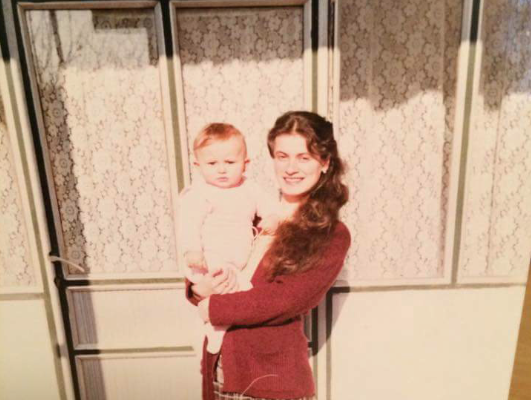Lessons from the Front

By: Miranda Cole
Very few students are aware of what happened overseas on April 6, 1992. War began in Bosnia and Herzegovina.
The war was composed of the Army of Republika Srpska and the Army of the Republic of Bosnia and Herzegovina. The war was caused because Serbians and Croatians (Army of Republika Srpska) wanted to annex Bosnia to create their own territory. The Serbians and Croatians used methods such as “ethnic cleansing” of any Bosnian Muslims, actions that were later declared as genocide. NATO forces were used to create a peace agreement, ending the war on Dec. 14, 1995. Over 38,200 civilian people were killed, and a majority of them were Bosnian Muslims.
Senada Muhic was born in Bijeljina, Bosnia and Herzegovina. She has resided in Waterloo for the past 16 years. She is currently 32 years old and has a 2-year-old daughter named Belma. Because of the war in Bosnia and Herzegovina, her family fled to Vienna, Austria, to live with her uncle for three months when she was 7 years old. After that they moved to Germany to establish a new life. They lived in Germany for roughly 10 years. After those 10 years, they would establish their current home in Waterloo.
Senada is a Muslim. Many people try to stereotype Muslims as terrorists. “It’s the most peaceful religion that you can imagine. We don’t support terrorism of any kind, and most of us try to help wherever these terrorist attacks happen,” Senada said.
She said it’s a big misconception in today’s society that Muslim and terrorist mean the same thing. “I am very fortunate to work in an environment where I am accepted for who I am. We even make jokes about things, and I am not bothered by it. I do have family members, especially women, who get treated different because they wear their Hijab (head cover). They get looked at differently and even harassed,” Senada said.
The hardest thing she said is that people see that she looks different and assume that they should be scared of her because of how she looks. People don’t consider that people dress different because of their religion, and that Islam is very peaceful.
Senada and her sister, Hanifa, found it very difficult to adjust to the school system here compared to in Europe. In Europe, the schools were very laid back and spent lots of time outdoors. They felt very rushed that they would only have about three to four minutes to get to their classes here. “Our classmates were not as accepting of us and would throw food at us during lunch time, and if we would ask a question because we would not understand the concept of something, we would get laughed at.”
It was very difficult for them to find a way to adjust to the school system here even more so because they both worked jobs after school and needed to help their parents with translating. “Our parents were scared to go to the grocery store because somebody might start a conversation with them, and they wouldn’t understand them. Somehow we both managed to get through high school and graduated with a very high GPA.”
Senada’s daughter is Belma, and her primary language is Bosnian. She knows how to count in English, colors and her ABCs. Belma also is learning a little bit of Spanish, just to broaden her vocabulary even more.
When she is a little older, Senada wants to teach her German, given that Senada lived there for several years of her life. “I am very grateful that I have given the opportunity to raise my daughter here. She will experience a safe childhood and will go to school here. She will be more acceptable then we were, and I like that. She will have a normal childhood, like most of American children. She will be raised here, but she will always know where she come from and why war is a horrible thing,” Senada said.
Senada recalled her personal experience and opinion about war. “Anyone who has gone through a war, whatever it was, a survivor or a soldier, will tell you how horrible war is. It is unnecessary, and it will leave marks physically or mentally. People who state otherwise have not lost their heated home in winter, a safe shelter or family members. They don’t know how it is to be hungry, and not know when you will get your next meal. The most important thing they don’t know is if they will wake up alive tomorrow to see their children. Now that I am a mother, I can’t even imagine what a mother would tell their kids screaming for food, but you don’t have anything to give them. People should be grateful and should learn how to give back instead try to push for something that they didn’t experience themselves.”
Senada is happy to live in Waterloo and is very grateful for the opportunities she and her family have in the United States. “The best thing about going through this is that it made me who I am today. It made me mature at an early age and helped my family try to start a new life. There was a lot of pressure, but we managed. I like the way I was raised. It makes me a responsible person, and I appreciate everything I have. I appreciate everything I have today more because I had to work for it, really hard.”









You must be logged in to post a comment Login